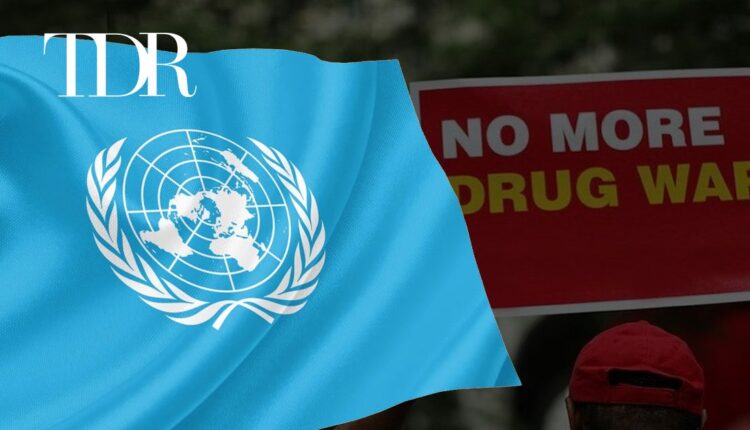
UN Advocates for End to War on Drugs
The TDR Three Key Takeaways regarding UN Advocates for End to War on Drugs
- UN calls for ending the War on Drugs, promoting a humane and balanced strategy.
- Mofokeng’s report suggests drug regulation models should vary in restrictiveness based on scientific evidence and power asymmetries.
- Erika Guevara-Rosas, Amnesty International’s senior director, supports the UN’s recommendations, calling the “war on drugs” a failed policy.
The United Nations (UN) has issued a report advocating for an end to the “War on Drugs” and a shift toward alternative regulatory approaches. This report, led by Tlaleng Mofokeng, the UN’s special rapporteur on the right to health, emphasizes that criminalization is an extreme option within a regulatory system and urges a more balanced and humane strategy.
Mofokeng’s report highlights that drug regulation models should be “more or less restrictive depending on scientific evidence and considering power asymmetries.” The report argues that permitting and regulating access could reduce overall harms associated with drug use. It calls on countries to decriminalize the use, possession, purchase, and cultivation of drugs for personal use and to adopt alternative regulatory approaches that prioritize health and human rights.
Mofokeng, also a medical doctor and professor at Georgetown University’s Law School, insists that leaders “move from a reliance on criminal law and instead take a human rights-based, evidence-based, and compassionate approach to harm reduction in relation to drug use and drug use disorders.” This approach aligns with the UN’s broader goal of protecting public health while upholding human rights.
The report underscores that the current punitive measures have led to various human rights violations. “The criminalization, overuse of incarceration, arbitrary deprivation of life, unnecessary use of lethal force in drug enforcement, and application of the death penalty as punishment in the name of public health have resulted in various human rights violations,” it states. Instead, well-designed drug policies can promote public health and human rights in a mutually reinforcing way.
Erika Guevara-Rosas, Amnesty International’s senior director for research, advocacy, policy, and campaigns, strongly supports the UN’s recommendations. She describes the “war on drugs” as a failed policy that has perpetuated violence, mass incarceration, and abuse, especially among marginalized communities. “Many lives have been sacrificed, and it’s time to stop wasting resources,” Guevara-Rosas asserts. She calls for governments to decriminalize personal use, possession, cultivation, and acquisition of drugs and move towards effective regulation to ensure legal and safe access.
The UN report also draws attention to the disproportionate impact of drug enforcement policies on marginalized communities. “The enforcement of drug laws and policies compounds other forms of discrimination and disproportionately affects certain individuals, such as persons in situations of homelessness or poverty, persons with mental health issues, sex workers, women, children, LGBTIQA+ persons, Black persons, Indigenous Peoples, migrants, persons who are incarcerated or detained, persons with disabilities, persons living with HIV, tuberculosis or hepatitis, and persons living in rural areas,” Mofokeng stated. These individuals often face harsher penalties and limited access to overdose reversal drugs and other vital healthcare services.
Mofokeng advocates for drug policies based on scientific evidence to reduce harm rather than punish behavior. The UN’s new stance on drug policy shifts from criminalization to health and human rights, aiming to better protect marginalized communities and improve access to healthcare services. Want to be updated on Cannabis, AI, Small Cap, and Crypto? Subscribe to our Daily Baked in Newsletter!



